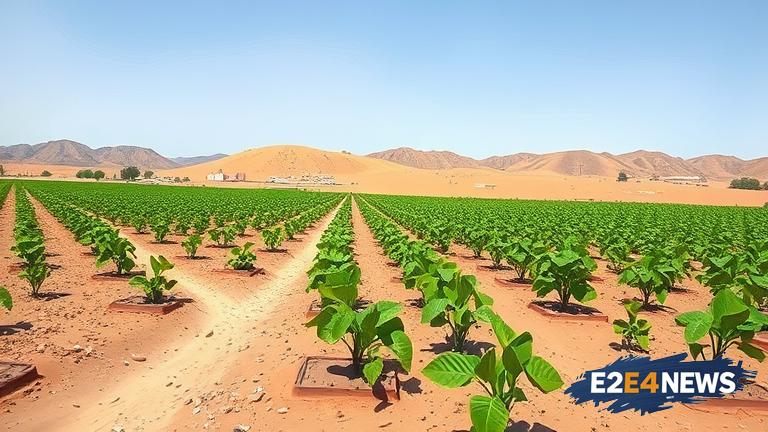Israel has long been a pioneer in agricultural innovation, and its latest endeavors in desert farming are no exception. The country’s agricultural sector has been working tirelessly to develop and implement new techniques to increase crop yields and promote sustainable farming practices in the desert regions. One of the key methods being employed is the use of advanced irrigation systems, which enable farmers to conserve water and reduce waste. Additionally, Israeli farmers are utilizing specialized crops that are resistant to drought and can thrive in the harsh desert conditions. These crops include a variety of fruits and vegetables, such as tomatoes, cucumbers, and bell peppers. The use of greenhouses is also becoming increasingly popular, as they provide a controlled environment for crops to grow and can help to extend the growing season. Furthermore, Israeli researchers are exploring the potential of using drones and other unmanned aerial vehicles to monitor and maintain crops, reducing the need for manual labor and increasing efficiency. The Israeli government has also launched initiatives to support desert farming, including providing funding for research and development projects and offering incentives for farmers to adopt sustainable practices. As a result of these efforts, Israel’s desert farming sector is experiencing significant growth, with many farmers reporting increased yields and profits. The country’s agricultural exports are also on the rise, with a growing demand for Israeli produce in markets around the world. The innovative approaches being developed in Israel’s desert farming sector are not only benefiting the country’s own agricultural industry but also have the potential to be applied in other regions facing similar challenges. In fact, Israeli experts are already sharing their knowledge and expertise with farmers and researchers in other countries, helping to promote sustainable agriculture and reduce poverty. The long-term implications of Israel’s desert farming initiatives are far-reaching, with the potential to improve food security, reduce environmental degradation, and promote economic development. As the global population continues to grow, the need for sustainable and efficient agricultural practices will only continue to increase, making Israel’s innovative approaches to desert farming more relevant than ever. The country’s commitment to agricultural innovation is a testament to its reputation as a leader in the field, and its desert farming sector is poised to play an increasingly important role in the global agricultural landscape. With its unique combination of cutting-edge technology, specialized crops, and sustainable practices, Israel’s desert farming sector is an exciting and rapidly evolving field that is worth watching. As the world continues to grapple with the challenges of food security and sustainability, Israel’s innovative approaches to desert farming are likely to have a significant impact. The country’s agricultural sector is a significant contributor to its economy, and the growth of the desert farming sector is expected to have a positive impact on the country’s GDP. In addition to the economic benefits, Israel’s desert farming initiatives are also having a positive impact on the environment, as they promote sustainable practices and reduce the country’s carbon footprint. The use of advanced irrigation systems and drought-resistant crops is helping to conserve water and reduce waste, while the adoption of greenhouses and other controlled environment agriculture methods is reducing the need for pesticides and other chemicals. Overall, Israel’s desert farming sector is a shining example of the country’s innovative spirit and its commitment to sustainable agriculture. As the sector continues to grow and evolve, it is likely to have a significant impact on the global agricultural landscape, and its innovative approaches are likely to be adopted by farmers and researchers around the world.
